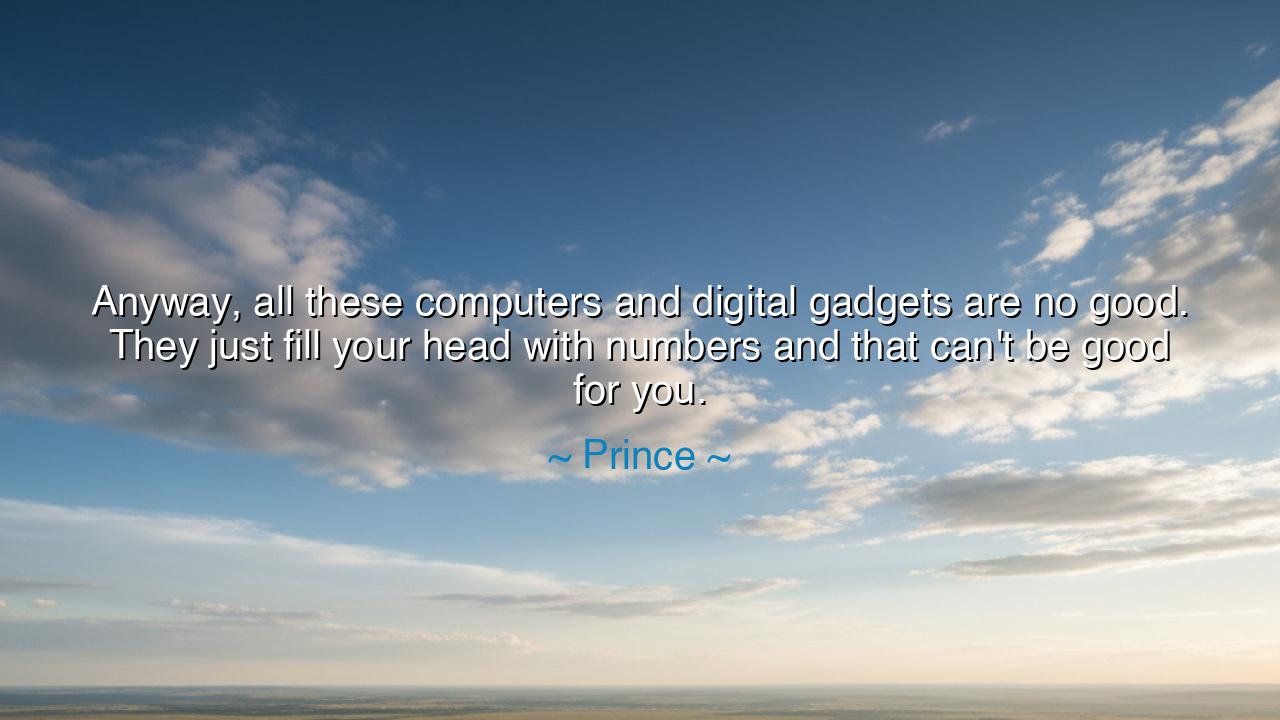
Anyway, all these computers and digital gadgets are no good. They
Anyway, all these computers and digital gadgets are no good. They just fill your head with numbers and that can't be good for you.






"Anyway, all these computers and digital gadgets are no good. They just fill your head with numbers and that can't be good for you." – Prince
In the ever-turning wheel of human progress, there are those moments when the tools we create, meant to elevate us, instead become the very chains that bind our minds. The words of Prince, spoken with his characteristic blend of insight and rebellion, reflect a truth about the digital age—a time when the machines we’ve built to serve us have begun to dominate our attention, filling our minds with an endless stream of numbers and information. It is a warning, not against technology itself, but against the unchecked obsession with the mechanical and quantitative that threatens to drown the richness of the human experience. For what is the cost of filling our minds with numbers and data if we lose the ability to think deeply, to dream freely, and to connect with the essence of life?
The ancient philosophers, such as Socrates, would have understood the danger of such an obsession. They believed that the mind was not a mere vessel to be filled with facts, but a living, breathing entity to be cultivated through reflection, dialogue, and the pursuit of wisdom. Plato, in his allegory of the cave, suggested that the pursuit of knowledge must always be tempered by the ability to see beyond the shadows, to recognize that reality is not merely what we are told or what we read, but something deeper. Prince’s statement, though set in the context of modern technology, evokes the ancient wisdom that knowledge must be accompanied by understanding—a wisdom that transcends numbers and enters the realm of human meaning.
In the same way, the great minds of ancient civilizations—whether in Egypt, Greece, or China—understood that human flourishing came not through the mere accumulation of facts, but through the cultivation of virtue, emotion, and intuition. The pyramids were not merely geometric feats; they were expressions of a deep connection between the human and the divine. The ancients built their worlds not on numbers alone, but on the spiritual and intellectual principles that guided their lives. To fill the mind only with data and calculation is to risk losing sight of these higher principles, the ones that make life worth living—the ones that guide us in our deepest moments of reflection.
Prince's words, like those of the ancient philosophers, urge us to pause in our pursuit of technological advancement and ask ourselves: What are we sacrificing in this pursuit? Technology, with its computers and gadgets, can be a tool for progress, but when it fills our minds with endless numbers, it can also be a prison. We are creatures of emotion, creativity, and meaning—and when we focus too much on the numerical and the mechanical, we risk losing sight of the human essence. Much like the ancient oracles, who sought not just answers but a deeper connection to the universe, we must ask whether the tools we create serve our highest goals or distract us from the deeper purpose of our lives.
Consider the story of Leonardo da Vinci, the quintessential Renaissance man who blended art, science, and mathematics in ways that had never been done before. Leonardo’s understanding of the world was not confined to cold calculations, but encompassed a deeper vision of life that brought the human experience into harmony with the world around him. His work, though mathematical in its precision, was driven by an understanding of the human spirit and the beauty of the natural world. Prince's critique of modern technology echoes this ancient wisdom: the tools we use—whether they are computers, gadgets, or machines—must always be in service of the human spirit, not the other way around.
In our own time, we can see the effects of technological obsession in our daily lives. We are surrounded by screens, filled with information, data, and numbers, and yet, often, this constant input leaves us feeling empty and disconnected. Prince's words are a call to reclaim our minds, to resist the pull of constant distraction, and to seek deeper meaning in the world around us. Just as the ancients understood the need for balance between intellect and spirit, so too must we recognize that the pursuit of knowledge must be tempered by moments of reflection, creativity, and human connection.
The lesson in Prince's statement is one of balance. Computers, gadgets, and the digital world can be powerful tools, but they must not dominate our attention or our inner lives. We must embrace technology without allowing it to replace the deeper human connections, the emotional resonance, and the intuitive wisdom that make us fully alive. The challenge before us is to use these tools as they were intended—to enhance our lives, not diminish them—and to ensure that the pursuit of progress never comes at the expense of the human soul. Let us, therefore, strive to live in harmony with the world we have created, balancing the digital with the organic, and the numerical with the emotional, so that we may continue to grow, not just in intellect, but in wisdom and spirit.






AAdministratorAdministrator
Welcome, honored guests. Please leave a comment, we will respond soon